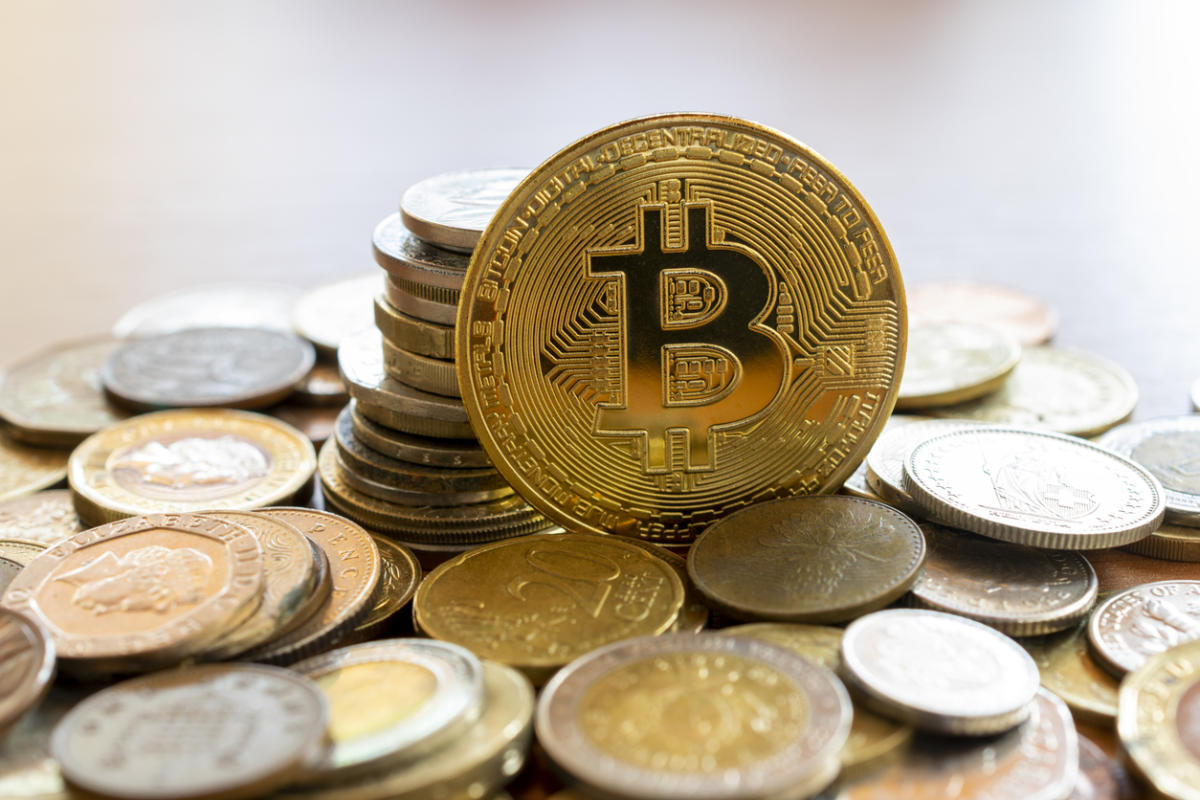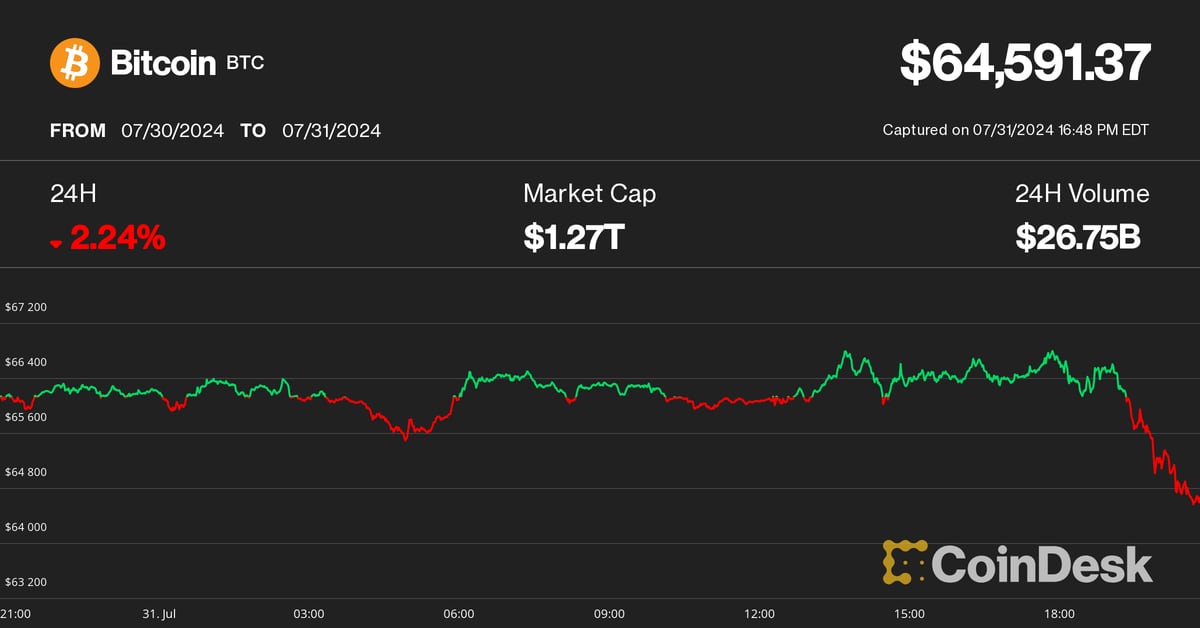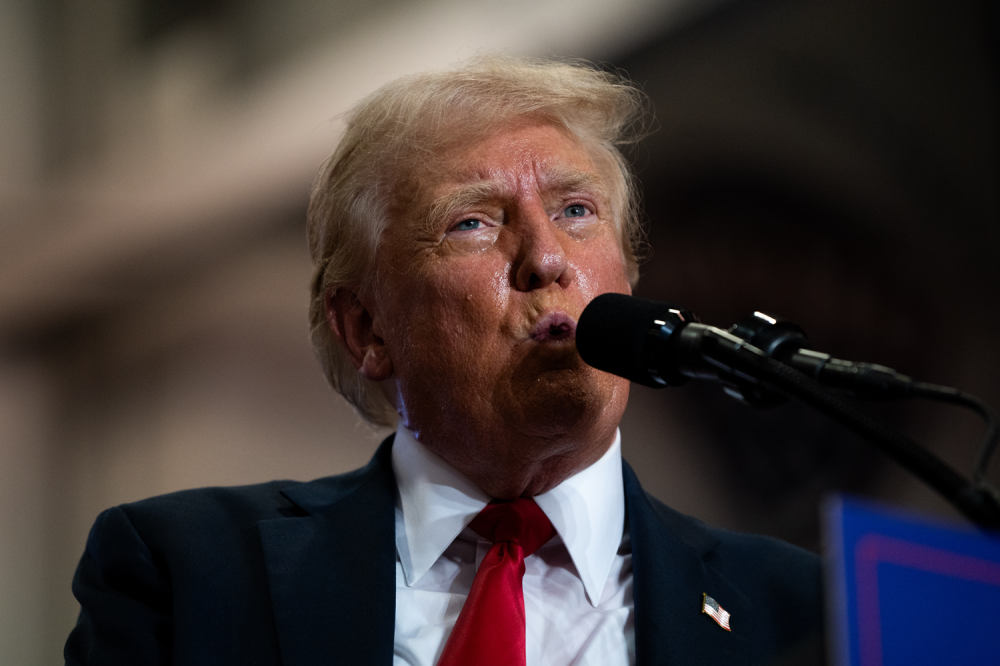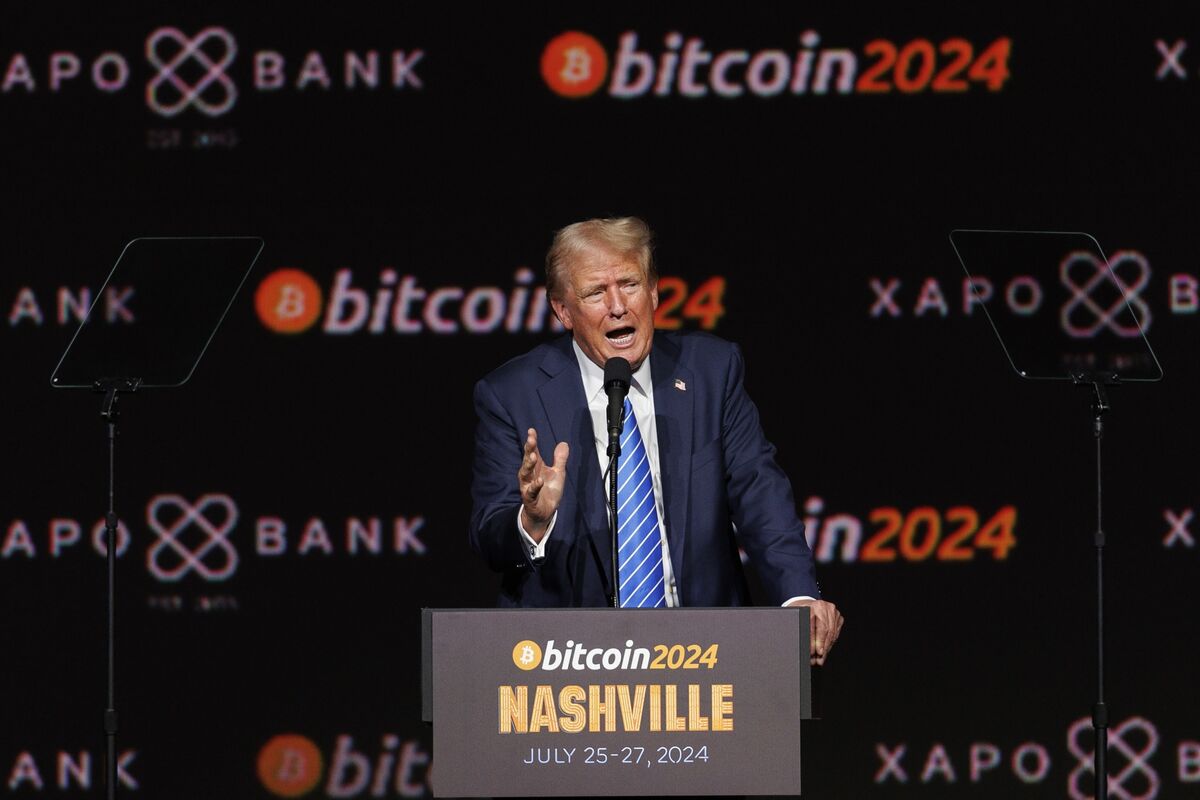Bitcoin
BTC Will Be on U.S. Balance Sheet in ‘Next 10, 15 Years’ and SOL for Less Than a Dollar

Anthony Pompliano, CEO of Professional Capital Management spoke with CoinDesk’s Jennifer Sanasie. The following is a lightly edited transcript of their interview.
Jennifer Sanasie: It’s Tuesday, July 30th, and this is Markets Daily, hosted by me, Jen Sanasie. On this show, we navigate the current shaping of the crypto markets, providing insights against the broader financial landscape. Whether you’re actively trading or simply fascinated by the volatility that is the crypto markets, this show is your compass to understanding what’s happened, where we are, and where we’re going. Good morning, everyone. Our guest today needs absolutely no introduction from venture capital, or podcasting. He’s really done it all. Anthony Pompliano, welcome to Markets Daily. Of course, thanks for being here. So as you know, on this show, we really want to dig into the crypto markets. We want to hear from people who have been successful at navigating the crypto markets. So my first question to you is how you’re allocating a portfolio this morning or how you’re thinking about allocating a portfolio if you look at what’s going on in the crypto markets this morning?
Anthony Pompliano: Thanks so much for having me.
Yeah, so I don’t really think just about the crypto market. I think kind of more broadly about finance in general and all asset markets. Our portfolio really is, crypto is a dominant percentage, more than 50%. But, we also have large allocations to Osage venture capital. And then we’ve got some real estate. And then increasingly, we’re doing more and more stuff in the public markets as well. On the crypto side, I would say that, you know, the majority of it is in Bitcoin. It’s a position that we’ve held for a long time. We’ve added to it throughout the years and it’s something that we kind of look at as a 20, 30 plus year investment. We don’t really trade at all. We don’t think about possibly selling based on price levels. It really is just kind of buy, hold a great asset forever and then hopefully I give it to my grandkids. The second biggest position in the portfolio is Solana. That’s a relatively new thing. We started putting that position on back around 45, 48 dollars I think last year.and then added to it on the way up pretty consistently. And that’s grown substantially as position size and now second largest. And, then I would say that other things in crypto that we’re really excited about, we sold a company earlier this year called Reflexivity Research to a publicly traded company called DeFi Technologies. DeFi Technologies does ETPs across Europe for kind of the long tail of crypto assets.
And, they’ve got a really strong business and seem to be doing pretty well. And so, you know, really just thinking about if crypto is a sector that we want to invest in, how do you get exposure across many different, you know, kind of aspects, both from liquid cryptocurrencies, private companies in terms of venture capital, and then also some of the public companies as well.
JS: You mentioned Sol there, most of the folks who come on this show have their two biggest crypto allocations as Bitcoin and Ether. But you just said you have Sol as your second biggest. I know that you’re bullish on Sol. Talk to me a little bit about your investment thesis when it comes to Solana over Ether.
AP: Yeah, I mean, you know my experience with Solana really was we were LPs in Multicoin’s Fund I and Multicoin Fund I invested in Solana. I think that they did it at less than a dollar, like a couple of pennies. And so there was this explosive move in the bull market of kind 2020 and 2021. Those guys did a fantastic job, I think, of managing that position, capturing a lot of profits there. And then, you know, when they were giving us kind of in-kind distributions,
I was saying to myself and to my partners, I don’t know what this is, right? We literally had spent no time on it, didn’t understand it and didn’t know what to do with the Solana. Do we hold it? Do we sell it? You where do we go? And so obviously in the bear market, it dropped significantly all the way down to I think $8. And then it started to kind of come back. And, one of the things that was interesting to me as I began to look at, why did it not die? It reminded me a lot of Bitcoin, right? Multiple times. Why did that not die? But second was I started to see the beginning
activity on Solana starting to eat into some of the ether activity or Ethereum activity. And not so much in a game of like Ethereum is not going to be strong or it’s not going to see the token price go up, but more so just the mispriced opportunity, right? If you think that both activities are going to go up, Solana’s activity may just go up at a faster rate. They may actually eat into some of the market share that Ethereum has for certain things like DEX activity or token launches, et cetera.
And so, if that was to occur, then you could expect the price of the sol token to go up more than the ether token. And that really was, you know, kind of the analysis. And so, you know, as I’ve shared previously, I sold any of the ether that I personally held kind of around the end of last year, beginning of this year, somewhere, wherever sol was trading at, you know, 70 early $70, $73, something like that. And so far its played out. And you know, I continue to believe that the Solana activity numbers and you know, kind of various macro factors will allow that asset specifically to continue to perform quite attractively. And so we’re just holding
JS: Anthony, what’s the worst investment you’ve ever made?
AP: The biggest investment mistakes are definitely investments I didn’t make, which is kind of like a dumb answer. But if you look at it from a pure capital that was not captured or capital that was lost, there was a number of different companies that early on I saw and just didn’t pull the trigger. I remember working at Facebook and I met with one of the executives at DoorDash. And the company was very small, very early. And, I could have had an opportunity to invest. I didn’t do it. And so when you see those things, you kind of learn over time that the very large asymmetric bets, sometimes it is worth just taking it because the risk reward is so skewed. But those definitely are the ones that kind of cost me the most money are just things that I didn’t do and should have.
JS: Let’s take the DoorDash example for a second. Why didn’t you make that investment? Talk me through your analysis… And what it was about DoorDash that made you skip on that investment?
AP: I’d never made any investments before. I was very much in the operator mindset. I was working at Facebook. I was focused on my job. was frankly, if I was going to do anything with them, I probably would have been like, hey, maybe I should go work there, kind of help on the growth team or something like that. But instead, knowing now what I know, I would have been talking to them from an investor standpoint. I would have said, hey, can I put money into this? And so when you see that, part of it is not just evaluating a specific investment, but also what mindset are you in? How many different early stage startups did I talk to the founders, did I even help the founders over the years before I realized, maybe I should also put money into these companies. And so that was a huge unlock for me personally in my career was putting capital to work, not just kind of being helpful, obviously drives a financial return. And then the other thing that I would say is, understanding kind of portfolio construction. There’s one thing to say…Hey, I’ve got a really high conviction in something like Bitcoin. It’s probably not going to go to zero. And so maybe I could lose, you know, 10, 20%, 30 % of my money, but it’s not like I’m going to lose everything. In venture, you can lose everything. And so really understanding the dynamics of like, well, you have to build a portfolio of these in order to drive an overall return is something that, you know, just took me a while to learn. And then once I understood it, you know, put me in a much better position to allocate capital.
JS: You mentioned just at the top of the show that you plan on holding Bitcoin for 20 or 30 years. We heard from Senator Lamas at the Bitcoin Conference in Nashville on the weekend. She put together a proposal for the government to hold Bitcoin for about 20 years to start tackling national debt. I know that you saw those remarks. I know that you’ve made comments on that. But, just curious to hear your thoughts on what you think of Lummis’ plan and holding Bitcoin in the National Reserve to start tackling the $35 trillion worth of debt that this country has.
AP: Yeah, I, you know, I understand what Senator Lummis is saying here. I think it’s a very clever idea. I think, you know, whether the United States holds Bitcoin on its balance sheet as a strategic reserve or as a strategic stockpile, right, actually backing the dollar or not, I think is separate and distinct from kind of the national debt conversation. It’s very hard to see a world where the Bitcoin that the United States would hold would actually, you know, make a significant dent in that. You know, if you look at kind of buying 1 million Bitcoin, 68, $70 billion today. If that goes up significantly, let’s say 20X, it still doesn’t even cover 10 % of the national debt. We actually are growing the debt faster than Bitcoin is growing. And so the debt would continue to expand. But I do think that it’s the right mentality. I think that the courage, frankly, that Senator Lummis has to not only do the work, put together the legislation, you know go present it, stake her own kind of social capital on doing something like that is commendable. And so really now that the idea is whether you think it’s for national debt or for other purposes, the consensus is forming that people across political aisle want the US government to hold Bitcoin. Then you saw that with some of leading presidential candidates, but also now you’re seeing it with senators and congressmen. You’re seeing it kind of in the regular constituency, both Republicans, Democrats, independents. They all are interested in this happening. And so we’re probably not at the point where that consensus is strong enough for it to happen tomorrow. But I do think within the next five years or so, there’s likely to be enough consensus where you’re gonna start to see that occurring at some degree on the national level.
JS: You know, we’ve been talking about the elections for probably every day on this show now. Curious to get your thoughts on what you think a Trump presidency could mean for the crypto industry versus a Harris presidency.
AP: Yeah, I mean, you this is one of those things that there’s a lot of narrative and then there’s kind of the facts and the data. And if you look at, you know, kind of the current administration, they have made more progress for the crypto industry than any other administration before them. Coinbase went public. We got the Bitcoin ETF and we got the Ether ETF. Those three things probably did more for the crypto industry than, you know, all other things combined previously.
In terms of regulators allowing for certain activity. So although the industry, rightfully so, has seen the current administration as being abrasive, there still was quite a bit of progress that occurred in that abrasive environment. And so, if we get a president, regardless of which president it is, who simply says, hey, we’re going to be friendlier, you would expect there to be an explosion of kind of positive developments. Now, what is interesting to go down that thread is
Well, what are the other things that you really want the regulators to do? Right. Maybe it is approve more ETFs. And so you kind of start going down a coin market cap lists or something of ETFs. Maybe there is something around kind of clear guidance for early stage startups, you know, in terms of token launches or the use of tokens. But the list is probably, you know, five things or less that really the regulators specifically can go and do. Now, if you go and then you add Congress, the Senate, even the president.
And, some of the legislation that could be passed. We’ve seen multiple bills around accounting rules and things like that that aren’t necessarily the SEC or the CFTC. That list may expand from five or less to maybe there’s like 25 things that could be done. And so I do think the bulk of a lot of the things people want done are actually in the legislative process, not necessarily from the regulators. Although the call three to five things that people want the regulators to do are really, really important as well.
And so really what we’re talking about here is a regime shift or a mentality shift, not just around regulation, but also from the political class in general. And if you go around the world, you’ve seen this happen before. People kind of ignore it, then they fight it, and eventually, the industry wins. And so I think that’s what ultimately is going to happen here in the United States is we’re kind of coming off of the fighting phase, and we’re starting into the winning phase for the industry.
JS: I want to broaden the conversation out and talk about areas outside of the United States. I know you tweeted recently that governments all over the world are probably talking about how Bitcoin might benefit them after the weekend’s remarks. But do think that governments are watching what’s happening here with the election and starting to think about how their policies might impact crypto innovation there and maybe how they can start holding Bitcoin in their reserves?
AP: I definitely think that governments around the world watch the United States, right, for nothing else than to be informed, but possibly even to copy. And you see this with central banks are a great example. The ECB said for a while, we’re not going to raise rates, we’re not going to raise rates. And then they sort of raised the rates after the US did it. And so I think that the United States is the leader on the global stage, especially in the financial markets. People look to us for guidance and leadership. And if you are a president somewhere in the world, and you hear that two of the three leading presidential candidates are talking about a strategic stockpile of Bitcoin for the US, you start asking your team, what is our Bitcoin strategy? What should we do? Should we go buy some before them? If they buy that Bitcoin, the price is going to go up. It’s going to be more expensive for us to buy it later. And so this global game theory between governments ends up playing out. And I think ultimately presidents around the world are saying to themselves, you know, I’m not going to sit back and just be the follower all the time.
Maybe we should actually be a leader on our own. And so, you know, whether that actually occurs or not remains to be seen. But, you one of the funny things to me is if you are a country and you want to create a strategic stockpile, then you should buy the Bitcoin and then tell people you did it. You should not tell them you’re going to buy it and then go buy it because you’re, yeah, you’re likely to affect the price in a negative way.
JS: Makes sense. How likely do you think it is the US has a strategic stockpile of Bitcoin in the near future?
AP: Well, the United States already has 210,000 Bitcoin give or take in its possession. It’s had many more over the years, but their kind of strategy has been to sell that and get cash. And so does the U.S. government hold Bitcoin today? Yes. Is it a strategic stockpile? I don’t think that’s how they view it. But I do think that, I don’t know, over the next 10, 15 years, for sure, the United States will have some Bitcoin on its balance sheet or kind of in a strategic stockpile. I think the question really just becomes, how aggressive are we in that?
And then also what is possible, you know, obviously RFK came out and said that the United States should buy 4 million Bitcoin. I don’t think that’s mathematically possible given how illiquid the market is, the trend of that illiquidity, and then also the amount of capital that would be needed in order to buy that Bitcoin over, you know, call it a 15, 20 year period. It just would become, you know, very difficult to see a world where we could spend that much money to do it. And so it’s more likely that, you know, it’s a smaller number but it’s something that I definitely think will occur at some point.
JS: It’s interesting you bring up the fact that you don’t think that’s mathematically possible. And it brings me to this question. Do you think that the politicians are talking about Bitcoin to get the attention of the industry with no…real plan to act to the drastic measures that they are speaking about. Because like you said, in a lot of these cases, it’s not mathematically possible or it doesn’t actually make sense to address the massive growing number of debt in the country.
AP: Yeah, mean, four million is probably not possible. One million probably is, right? So we’re still talking directionally the same thing. It’s just that the magnitude or the size ends up being a little bit different. On top of that, look, politicians are politicians, right? And part of what they are supposed to do is they are supposed to represent the will of the people. One of the things that most people get kind of incorrect is that they’re like, I’m trying to evaluate the politician based on what they believe. Well, actually the politicians supposed to represent what we believe as the people and so you know the negative view of that is they’re pandering they’re basically saying what we, you know, they think we want to hear and then they’re going to get an office do whatever they want. The positive view of it is no, they’re listening to their constituency and their constituency is telling them, I want you to be pro-Bitcoin. So the smart ones are saying I’m pro- Bitcoin. so, you know, regardless, yes, their campaign promises, promises is doing a lot of heavy lifting in that sentence. And so do they have to fulfill the promises? Not necessarily. But I do think that there’s a lot of people who are going to go into the ballot box and they’re going to say, well, I have two candidates that I’m voting for three candidates that I’m going to evaluate the promises of today.
And one of them is promising me something I like and the other is promising me something I don’t like regardless of what they’re going to do. I can only evaluate the promises today. And so obviously I’m going to go for the person who’s promising me a positive thing. And so it’s this weird thing where, you know, people always get hung up on like, the politician do what they promised? Well, you you should expect that they probably aren’t going to do a hundred percent of what they promised. And, one of the things I always point to is how many presidents have talked about, you know, releasing some sort of information.
The JFK assassination files, I think Trump had said, hey, I’m going to release this information, gets in the office, doesn’t do it. And from people I know that were kind of close to the administration, he basically learned new information and then decided against it. And so if that is true and that’s how it played out, well, we don’t know what that information is. And so how do we evaluate? Maybe if we had that information, we’d also agree not to release it. And so it becomes this weird dynamic where constituents and the population want to critique politicians, but we don’t have all the information they have. And so that doesn’t mean we should trust them, right? We should be actually be very kind of skeptical of the promises they make and the things that they say they’re going to do. But I do think that also sometimes we should understand, you know, if we had all of the information, we actually may make the same decisions, which is kind of a little bit weird, given how I think much disdain most people have for kind of political class.
JS: I think those are all great points to make ahead of the election in November now. I know we only have a few minutes left and I really have been waiting to ask you this question because I know you’re a former army sergeant and it’s not uncommon to come across former military who are now founders or operating at high levels in venture capital. And I was curious to get your thoughts on what you think it is about people with military experience that makes them such successful founders and CEOs.
AP: Well, I mean, you the military does a fantastic job, I think, breaking people down and then rebuilding them to be one leaders, but also to thrive in kind of chaotic, uncertain environments. Right. And if you think of the stakes when they’re doing that training. It tends to be life or death. And so when you kind of take that and bring it to something like the business world, you need leadership. You need to be able to understand and be resilient and thrive in that uncertain environment. But the stakes are much lower. And so I think that people have been exposed to some of the extreme stresses of military or kind combat deployments. They end up actually thriving even more in a much more relaxed environment of the business world where the stress is kind of a different type of stress.
And so, you know, it I think is a very natural progression because at the end of the day, business is just leading people to accomplish something. And there’s a lot of similarities to what the military is doing in the same way.
JS: When you’re looking at businesses to invest in, do you look at the founders and the experiences they’ve had in the past? Maybe it’s not military experience, but do you look for extraordinary experiences in founders when you’re thinking about investing in their companies?
AP: We’re looking for winners and winning can come in many different forms. But when you’re evaluating a founder, you want to find someone who is going to be able to get the job done. In that, depending on the industry, depending on the stage of the company, depending on a lot of the competitive components to what they’re doing, can be very, very different. Sometimes you need somebody who is very type A personality, somebody who has a long track record of success. But then other times, you actually need somebody who is much more kind of introverted, much younger, much more technical, and frankly, is too naive to understand what they’re trying to do is possible. And so really understanding, what is the task at hand and what is the type of person who’s most likely to be successful here. It’s a case by case scenario.
JS: All right, we got one minute left. got to ask you, I’ve asked you what your worst investment you ever made was. What’s the best?
AP: Probably investing in my family. you know, if, I kept the scorecard of all the financial investments, you know, I probably would, would be pretty proud of that. But frankly, all of the financial investments don’t stack up to, kind of just investing in, you know, human relationships and, making sure that you’re happy every day. And, you know, if you can remember that, all of the investing is just a game that we play on the internet. It’s a lot easier to not get too excited when things are going well and not get too down when things aren’t going well.
Bitcoin
Grayscale Unveils Bitcoin Mini Trust ETF

Bitcoin Currency
Grayscale Investments The Bitcoin Mini Trust began trading on Wednesday with a 0.15% expense ratio, offering a lower-cost option for bitcoin exposure in the market.
The Mini Trust, which has the symbol BTC and trades on NYSE Arca, is structured as a spin-off of the Grayscale Bitcoin Trust (GBTC). New shares will be distributed to existing GBTC shareholders with the fund contributing a portion of its bitcoin holdings to the new product. According to a company press releaseBTC’s S-1 registration statement became effective last week.
“The Grayscale team has believed in the transformative potential of Bitcoin since the initial launch of GBTC in 2013, and we are excited to launch the Grayscale Bitcoin Mini Trust to help further lower the barrier to entry for Bitcoin in an SEC-regulated investment vehicle,” said David LaValle, Senior Managing Director and Head of ETFs at Grayscale.
The Bitcoin Mini Trust’s debut comes amid growing interest in ETFs based on the current price of the two largest cryptocurrencies by market cap, bitcoin and ether. Spot bitcoin ETFs have generated nearly $18 billion in inflows since the first ones began trading on Jan. 11, though GBTC has lost nearly $19 billion in assets.
This fund differs from other funds because it is a conversion of an existing fund and has a 1.5% fee, the highest among spot bitcoin products that have received SEC approval this year.
Mini Bitcoin Trust Low Fee
On a Post X On Wednesday, Bloomberg senior ETF analyst Eric Balchunas noted the Bitcoin Mini Trust’s “lowest fee in the category…”
“[Important] to recognize how incredibly cheap 15bps is — about 10x cheaper than spot ETFs in other countries and other vehicles,” Balchunas wrote, adding that this pricing strategy reflects the competitive nature of the U.S. ETF market, which he referred to as the “ETF Terrordome.”
“This is what Terrordome does to fund [cost]. It reaches 1.5% [and] end in 0.15%, how to go from [a] country club to the jungle. But that’s why all the flows are here, investor paradise,” he noted.
Read more: Spot Bitcoin ETF Inflows Hit Daily High of Over $1 Billion
Bitcoin was recently trading at around $66,350, virtually flat since U.S. markets opened on Wednesday.


Grayscale also offers two spot Ethereum ETFs, the Grayscale Ethereum Trust (ETHE) and the Grayscale Ethereum (ETH) Mini Trustwhose performance is based on ETHE. ETHE outflows exceeded $1.8 billion in its first six days of trading, while ETH added more than $181 million in the same period, according to Farside. The remaining seven ETFs generated about $1.2 billion in inflows.
The story continues
Read more: Spot Ethereum ETFs Approved to Start Trading
Permanent link | © Copyright 2024 etf.com. All rights reserved
Bitcoin
Bitcoin (BTC) Price Drops Below $65K After FOMC as Middle East Tensions Rise

Cryptocurrencies fell sharply on Wednesday as rising geopolitical risks captivated investors’ attention following the conclusion of the Federal Reserve’s July meeting.
Bitcoin (BTC) fell to $64,500 from around $66,500, where it traded following Federal Reserve Chairman Jerome Powell’s press conference and is down more than 2% in the past 24 hours. Major altcoins including ether (ETH)sunbathing (SUN)Avalanche AVAX (AVAX) and Cardano (ADA) also fell, while Ripple’s XRP saved some of its early gains today. The broad cryptocurrency market benchmark CoinDesk 20 Index was 0.8% lower than 24 hours ago.
The liquidation happened when the New York Times reported that Iran’s leaders have ordered retaliation against Israel over the killing of Hamas leader Ismail Haniyeh in Tehran, raising the risk of a wider conflict in the region.
Earlier today, the Fed left benchmark interest rates unchanged and gave little indication that a widely expected rate cut in September is a given. The Fed’s Powell said that while no decision has been made on a September cut, the “broad sense is that we are getting closer” to cutting rates.
While digital assets suffered losses, most traditional asset classes rose higher during the day. U.S. 10-year bond yields fell 10 basis points, while gold rose 1.5% to $2,450, slightly below its record highs, and WTI crude oil prices rose 5%. Stocks also rallied during the day, with the tech-heavy Nasdaq 100 index rebounding 3% and the S&P 500 closing the session 2.2% higher, led by 12% gains in chipmaker giant Nvidia (NVDA).
The different performances across asset classes could be due to traders’ positioning ahead of the Fed meeting, Zach Pandl, head of research at Grayscale, said in an emailed note.
“Equities may have been slightly underutilized after the recent dip, while bitcoin is coming off a strong period with solid inflows, while gold has recovered after a period of weakness,” he said.
“Overall, the combination of Fed rate cuts, bipartisan focus on cryptocurrency policy issues, and the prospect of a second Trump administration that could advocate for a weaker U.S. dollar should be viewed as very positive for bitcoin,” he concluded.
UPDATE (July 31, 2024, 21:30 UTC): Adds grayscale comments.
Bitcoin
Donald Trump’s Cryptocurrency Enthusiasm Is Just Another Scam

Former US President Donald Trump spoke at the Libertarian National Convention in May and lent his a strong support to crypto: “I will also stop Joe Biden’s crusade to crush crypto. … I will ensure that the future of crypto and the future of bitcoin is made in the US, not taken overseas. I will support the right to self-custody. To the 50 million crypto holders in the country, I say this: With your vote, I will keep Elizabeth Warren and her henchmen out of your bitcoin.”
Former US President Donald Trump spoke at the Libertarian National Convention in May and lent his a strong support to crypto: “I will also stop Joe Biden’s crusade to crush crypto. … I will ensure that the future of crypto and the future of bitcoin is made in the US, not taken overseas. I will support the right to self-custody. To the 50 million crypto holders in the country, I say this: With your vote, I will keep Elizabeth Warren and her henchmen out of your bitcoin.”
Trump continued to court the cryptocurrency industry in the months that followed; he he appeared at the Bitcoin 2024 Conference in Nashville this week, along with independent presidential candidate Robert F. Kennedy Jr.’s parting words to Trump — “Have fun with your bitcoin, your cryptocurrency and whatever else you’re playing with” — were less than enthusiastic, but the industry itself remains packed with ardent Trump supporters.
This turnaround came as a surprise, given Trump’s previous strong opposition to cryptocurrency. When Facebook was floating its Libra cryptocurrency in 2019, Trump tweeted: “I am not a fan of Bitcoin and other cryptocurrencies, which are not money, and whose value is highly volatile and based on thin air.” Former national security adviser John Bolton’s White House memoir, The Room Where It Happened, quotes Trump as telling Treasury Secretary Steven Mnuchin: “Don’t be a trade negotiator. Go after Bitcoin.” [for fraud].” In 2021, Trump counted Fox Business that bitcoin “just looks like a scam. … I want the dollar to be the world’s currency.”
Why the change? There doesn’t seem to be any crypto votes. Trump’s “50 million” number comes from a poorly sampled push survey by cryptocurrency exchange Coinbase which claimed 52 million cryptocurrency users in the United States starting in February 2023. But one survey A survey conducted last October by the US Federal Reserve showed that only 7% of adults (about 18.3 million people) admitted to owning or using cryptocurrencies — down from 10% in 2022 and 12% in 2021. Many of these people are likely wallet owners who were left holding the bag after crypto plunged in 2022 — and are not necessarily new fans.
What Trump wants from the cryptocurrency industry is money. The cryptocurrency industry has already raised more than US$ 180 million to run in the 2024 US elections through his super PACs Fairshake, Defend American Jobs and Protect Progress.
Fairshake spent $10 million on taking Rep. Katie Porter in the primary battle for Dianne Feinstein’s California Senate seat by funding Porter’s pro-crypto rival Adam Schiff. This put $2 million to knock out Rep. Jamaal Bowman in the Democratic primary for New York’s 16th District in favor of pro-crypto George Latimer. In the Utah Senate Republican primary, Rep. John Curtis defeated Trent Staggs with the help of $4.7 million from Defend American Jobs. In Alabama’s House District 2, the majority of campaign expenses came from the cryptocurrency industry.
Fairshake is substantially financed by Coinbase, cryptocurrency issuer Ripple Labs, and Silicon Valley venture capital firm Andreessen Horowitz, or a16z. Silicon Valley was awash in cryptocurrencies during the 2021 bubble, and a16z in particular continues to promote blockchain startups to this day — and still holds a huge amount of bubble crypto tokens that he wishes he could cash in on.
Many in Silicon Valley would like an authoritarian who they think will let them run wild with money — while bailing them out in tough times. Indeed, Trump promised Bitcoin 2024 participants that he hold all bitcoins that the United States acquires. (Never mind that it is usually acquired as the proceeds of crime.) Silicon Valley explicitly sees regulation of any kind as its greatest enemy. Three a16z manifestos — “Politics and the Future” It is “The Techno-Optimist Manifesto” and 2024 “The Small Tech Agenda—describe co-founders Marc Andreessen and Ben Horowitz’s demands for a technology-powered capitalism unhindered by regulation or social considerations. They name “experts,” “bureaucracy,” and “social responsibility” as their “enemies.” Their 2024 statement alleges that banks are unfairly cutting off startups from the banking system; these would be crypto companies funded by a16z.
Trump’s vice presidential pick, Senator J.D. Vance, is a former Silicon Valley venture capitalist. He was once employed by Peter Thiel, who bankrolled Vance’s successful 2022 Senate run; Vance has been described as a “Thiel creation”. He has increased support for the Trump ticket among his venture capital associates. Vance is a bitcoin holder and a frequent advocate of encryption. He recently released a draft bill to review how the Securities and Exchange Commission (SEC) and the Commodity Futures Trading Commission (CFTC) control crypto assets. In 2023, he circulated a bill to prevent banks from cutting out cryptocurrency exchanges.
Minimal regulation has been tried before. It led to the wild exuberance of the 1920s, which ended with the Black Tuesday crash of 1929 and the Great Depression of the 1930s. Regulators like the SEC were put in place during this era to protect investors and transform the securities market from a jungle into a well-tended garden, leading to many prosperous and stable decades that followed.
Crypto provides the opposite of a stable and functional system; it is a practical example of how a lack of regulation allows opportunists and scammers to cause large-scale disasters. The 2022 Crypto Crash repeated the 2008 financial crisis in miniature. FTX’s Sam Bankman-Fried was feted as a financial prodigy who would perform economic miracles if you just gave him carte blanche; he ended up stealing billions of dollars of customers’ money, destroying the lives of ordinary people, and is now in a prison cell.
U.S. regulators have long been concerned about the prospect of cryptocurrency contagion to the broader economy. Criminal money laundering is rampant in cryptocurrency; even the Trump administration has made rules in December 2020 to reduce the risk of money laundering from crypto. Meanwhile, the crypto industry has persistently tried to infiltrate systemically risky corners of the economy, such as pension funds.
Four U.S. banks collapsed during the 2023 banking crisis, the first since 2020. Two of them, Silvergate Bank and Signature Bank, were deeply embedded in the crypto world — Silvergate in particular appears to have collapsed directly from its heavy reliance on FTX and failed a few months after that. Silicon Valley Bank was not involved in crypto but collapsed due to a run on the bench due to panic among venture capital deposit holders, particularly Thiel’s Founders Fund.
Project 2025the Heritage Foundation mammoth conservative wish list The plan, which Trump and Vance have both endorsed and tried to distance themselves from at various times, emphasizes the importance of party loyalists, noting especially financial regulation. The plan recommends replacing as much of the federal bureaucracy as possible with loyalists and “trusted” career officials rather than nonpartisan “experts.” Vance defended in 2021 that Trump should “fire every mid-level bureaucrat, every civil servant in the administrative state” and “replace them with our people.” Loyalty will likely trump competence.
Crypto is barely mentioned directly in Project 2025 — suggesting it has little active support among the broader conservative coalition. But near the end of the manifesto is a plan to dismantle most U.S. financial regulations and investor protections put in place since the 1930s, suggesting the exemption the crypto industry seeks from current SEC and CFTC regulations.
Bitcoin, the first cryptocurrency, started as an ideological project to promote a strange variant of Murray Rothbard’s anarcho-capitalism and the Austrian gold-backed economy—the kind we abandoned to escape the Great Depression. Crypto quickly co-opted the “end of the Fed” and “establishment elites” conspiracy theories of the John Birch Society and Eustace Mullins. It’s a way for billionaire capitalists like Thiel, Andreessen and Elon Musk to claim they’re not part of the so-called elite.
If a second Trump administration were to limp along with financial regulators and allow cryptocurrencies to have free rein, it could help foster the collapse of the U.S. economy that bitcoin claimed to prevent. But Trump is more likely to be happy to take the crypto money and run.
Bitcoin
Trump’s Bitcoin (BTC) Reserve Plan Seen as Just a ‘Small Token Stash’

Donald Trump’s recent promise to create a “strategic national stockpile of Bitcoin” may not turn out to be as big a commitment as the hype surrounding the announcement makes it seem.
“Trump’s proposal is extremely modest,” said George Selgin, director emeritus of the Center for Monetary and Financial Alternatives at the Cato Institutea Washington-based public policy group. “It doesn’t have much economic implication.”
-

 Ethereum12 months ago
Ethereum12 months agoEthereum Posts First Consecutive Monthly Losses Since August 2023 on New ETFs
-

 Regulation12 months ago
Regulation12 months agoCryptocurrency Regulation in Slovenia 2024
-

 News12 months ago
News12 months agoNew bill pushes Department of Veterans Affairs to examine how blockchain can improve its work
-

 Regulation12 months ago
Regulation12 months agoThink You Own Your Crypto? New UK Law Would Ensure It – DL News
-

 Regulation12 months ago
Regulation12 months agoUpbit, Coinone, Bithumb Face New Fees Under South Korea’s Cryptocurrency Law
-

 Regulation12 months ago
Regulation12 months agoA Blank Slate for Cryptocurrencies: Kamala Harris’ Regulatory Opportunity
-

 Regulation12 months ago
Regulation12 months agoBahamas Passes Cryptocurrency Bill Designed to Prevent FTX, Terra Disasters
-

 Regulation12 months ago
Regulation12 months agoIndia to Follow G20 Policy for Cryptocurrency Regulation: MoS Finance
-

 News1 year ago
News1 year ago“Captain Tsubasa – RIVALS” launches on Oasys Blockchain
-

 Ethereum1 year ago
Ethereum1 year agoComment deux frères auraient dérobé 25 millions de dollars lors d’un braquage d’Ethereum de 12 secondes • The Register
-

 News12 months ago
News12 months agoEU supports 15 startups to fight online disinformation with blockchain
-

 News1 year ago
News1 year agoSolana ranks the fastest blockchain in the world, surpassing Ethereum, Polygon ⋆ ZyCrypto











